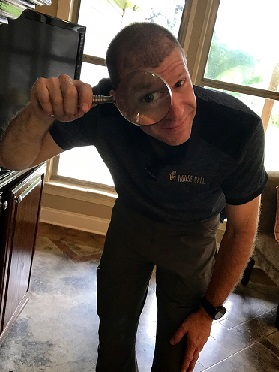Without a doubt, one of the most important documents in the home inspection process (or any business deal, for that matter) is the contract. Contracts help set the terms of the business relationship, ensure that the parties know exactly what’s expected of them and provide a legal framework against which any future disputes should be judged. This is the last entry in a three-part discussion on creating an effective inspection agreement. (Click here to read part 1).

Intellectual Property Rights
While each state’s laws regarding the inspection process differ, most states identify the client as the owner of the completed inspection report. This places limitations on exactly what an inspector can do with a report once it’s been paid for and delivered to a client.
If allowable by your local laws, we recommend adding language to your contract specifying that the report is the sole property of the inspection company that produced it and is being paid for by the client for a one-time use. This ensures that the inspector retains rights to their intellectual property. As a result, we can use pictures from a report in any marketing or educational venture we desire. We can also utilize portions of the report for any purpose, including marketing, education or resale to another client if our initial buyer’s sale falls through. This also serves to protect us in the event that the client (or one of the real estate agents involved in the deal) resells or gives away the inspection report to another buyer, as it places responsibility on the client to ensure that no one else is given access to the inspection report.
(FYI: In the event that you decide to resell a previously performed home inspection report, you must be certain that you protect yourself from any and all future liability. As a home inspection report is a snapshot in time, documenting the condition of an individual property at one specific point in time, you must utilize a new contract protecting yourself from liability when reselling a previous report. We use a contract specifying that the new client is purchasing an old report, that no additional inspections have been performed on the property, and that the client waives all recourse against the home inspector for any conditions of the subject property. Without acceptance of these terms and this waiver of liability (as well as the aforementioned intellectual property claim in the original home inspection contract), no previously performed inspection report is ever released by our company.
Privacy Policies and Affiliate Relationships
Especially in today’s digital world, many companies engage in sharing their clients’ information for marketing purposes, which often comes with a financial benefit to the company providing the information. While each state has their own laws dictating the sharing of personal information, it’s important that you disclose any relationships that you may have with third-party providers, particularly if those relationships involve any compensation. It’s also important (and a legal requirement) that you offer your clients an easy way to opt-out of the sharing of their information. This can be accomplished by simply providing your email address to your clients with instructions to contact you if they would like to limit the sharing of their information.
Open To Negotiation
A home inspection contract is typically referred to as a “contract of adhesion,” which is where one entity (in this case, the home inspector) holds all the negotiating power and the other party (the client) has little to no say over the terms of the agreement. Contacts of adhesion are often scrutinized by the courts, as they are frequently considered to be unfairly weighted in favor of the business, with the client (that needs the services which the business provides) often left with little choice but to accept the terms of the contract.
In order to combat this image of unfairness in our contracts, we’ve implemented a section dedicated to written modification of our contract. It states that the contract may only be amended by written modification agreed to by both parties. It includes a “negotiated terms” section, with blank lines placed in the contract where written modifications can be documented. While it’s rare that a contract will be modified, having this space allows for modification while also showing that the inspection company is open to amending its contract if necessary. This section can help to provide some ammunition if a plaintiff attempts to use the “contract of adhesion” argument in court, claiming that our contracts are too restrictive.

We will often use the “negotiated terms” section to identify things that a client doesn’t want included in their inspection. Just this week there was a client who brought in his own HVAC expert to inspect those systems. We wrote in the negotiated terms section that “per client’s request, the HVAC systems are not included in the home inspection/outside HVAC tech has been contracted by client to inspect these systems.”
It’s Great, But…
While all this information is great, and implementing some or all of it can certainly help to make your inspection contract a more functional document, none of this information matters if you don’t get your client to sign the contract. Without your client’s signature, it’s not worth the paper it’s written on. Be sure to get your contract signed for every inspection, preferably before you do the inspection, and absolutely before you release the completed inspection report to the client. Get your contract signed (and get paid) before releasing your report, because that’s the only time you have any leverage to get these things done. Once you release that report, your client has no reason to sign (or pay for) anything. Get it done ahead of time, or it likely won’t get done at all.
Sign on the Dotted Line
The contract must be signed by the client as well as the inspector, as both parties to an agreement must sign a contract for it to be valid. Both parties must also be provided with a copy of the signed contract, so be sure to confirm that the client has an opportunity to receive a signed copy of the agreement. As many inspection contracts today are signed digitally, this can be accomplished by including some language reminding your client to print or download a copy of the completed contract once they’ve finished signing it.
Automate, Automate, Automate
I’ve found that, without a doubt, the best way to ensure that your contract gets signed (and you get paid) is to automate these tasks. By utilizing a home inspection software that automates these processes, I know they’re taken care of, which means I can concentrate my attention to more important things (like finding new clients to sign new contracts).
My current inspection software will notify my clients when their report is done, prompting the ones who haven’t yet signed the contract and paid the fee to do so, so that they can access their completed report. I simply hit a button telling the software that I’m done with the report, and automation does the rest. I don’t have to send emails, make phone calls or chase anyone down; it’s all done for me.
Even if your current home inspection software doesn’t offer these benefits, and you’re not yet sure you want to make the jump to a new inspection software, various other software programs are available for you to use to automate the process of contract signing. DocuSign is relatively inexpensive and not too difficult to learn. Prior to moving to our current home inspection software, we used DocuSign for a number of years to automate the process of getting documents signed before the inspection. It’s fairly easy to set up, and once done you can set it notify you by email once a client has signed their inspection agreement.
Now, Not Later
Lastly, I wanted to stress the importance of getting your inspection contracts signed prior to the home inspection. This does many different things for you, including lessening the number of things you have to worry about during and after the physical inspection. It can also reveal any future problems by identifying those clients that are likely to argue with you regarding the specifications of your contract, allowing you to either come to some type of agreement with them regarding your differences or simply pass them along to some other unsuspecting home inspector (your competition!) But most importantly, having your client read and sign the inspection agreement ahead of time helps to eliminate one of a plaintiff’s most common arguments against enforcement of your contract: that they signed the agreement under duress.
In simplified terms, the plaintiff’s counsel will argue that because their client was on the last day of their inspection period, and they were not afforded the opportunity to review your inspection contract before the actual inspection date, they were forced into signing the agreement. They will argue that because they were so close to the end of their inspection window, they would not have been able to schedule another inspection on such short notice and were in effect forced to agree to your terms.
By sending them the agreement ahead of time, you allow them time to read the agreement and give them the opportunity to search for a different inspector if they do not agree to your terms. An added benefit may be that if they do actually read your contract, they may ask questions which will allow you to adjust their expectations so that those expectations better align with the reality that is a home inspection. And clients that know what to expect are much less likely to cause problems for you in the future.

All That?
It seems kind of hard to imagine that one document, your inspection contract, could provide all these benefits. But that’s what a contract is intended to do: outline exactly what it is that two parties are agreeing to when one hires the other to perform a service. By outlining what your company is going to do and specifying what you’re not going to do, you can help take some of the mystery out of the home inspection process. And by doing so, you’re better positioned to follow some of my favorite advice for how to run a successful business:
Always under-promise and over-deliver.
Ubiquitous Legal Disclaimer
Please be aware that this article is intended to provoke thought about your inspection contract and prompt you to consider ways to possibly improve your agreement. It is not intended to be legal advice and should not be taken that way. As always, we recommend consulting with a qualified local attorney prior to implementing any changes to your contract. Laws vary from state to state, and what is permissible in one state may not be so in another. Always take adequate legal precautions prior to making any substantive changes to your business or its paperwork.
I welcome all feedback (both positive and negative) on this post.
Please take a moment to leave a comment below. Thank you!
Want to be an Influencer in Your Field? Share This Post!
Thanks, Joe


